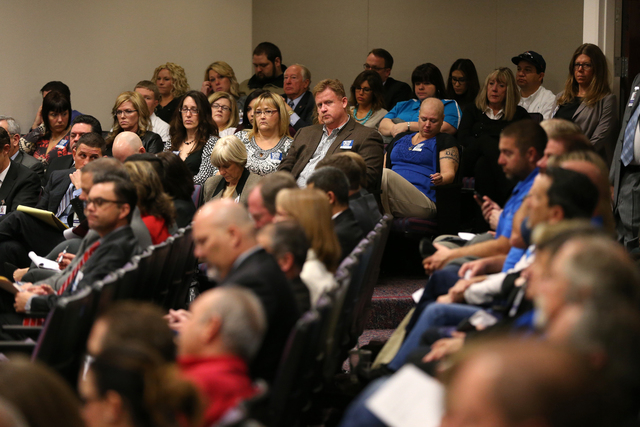Nevada lawmakers address reforms of state construction defect law

CARSON CITY — Suggesting that Nevada’s construction defect law has benefited attorneys rather than homeowners, lawmakers and construction industry representatives testified in support of a bill Wednesday that they said would fix problems with the law.
Assembly Bill 125, called by supporters the Homeowner Protections Act of 2015, would restrict the definition of what constitutes a home defect, repeal a provision allowing attorneys fees and costs in a home defect judgments, and require specific descriptions of defects.
The bill was introduced Friday and discussed at a joint hearing of the Assembly and Senate Judiciary committees. It is the latest measure sought by Republican lawmakers who are enjoying their new majority status in the Legislature. The changes sought by Republicans have been pushed without success for years.
The measure will take a simple majority vote to send it to GOP Gov. Brian Sandoval.
In further evidence the GOP majority is not going to go slow on their reform agenda this session, AB125, has already been scheduled for a possible vote in the Assembly Judiciary Committee on Friday.
Opponents called it a partisan move that will hurt homeowners.
Assembly Majority Leader Paul Anderson, R-Las Vegas, said the current law was well-intended when the Legislature approved it more than a decade ago but has had unintended consequences, putting the focus on lawyers rather than homeowners.
Between 2006 and 2012, construction defect lawsuits in Nevada increased by 355 percent while at the same time, new-home construction declined 86 percent, he said.
A homeowner is 38 times more likely to be involved in construction defect litigation in Nevada than anywhere else in the nation, Anderson said.
One of the biggest issues is the award of attorneys fees and costs when a lawsuit succeeds, he said.
Anderson cited one example involving 99 homes in which homeowners were awarded $580,000 to fix their issues. The attorneys were awarded another $9.3 million in fees, costs and interest, Anderson said. The case involved the Aventine-Tramonti Homeowners Association versus Vanguard Piping Systems.
State Sen. Patricia Farley, R-Las Vegas, who runs Southwest Specialties Inc., a midsize construction company, said concerns over the home defect law directly affect whether she takes a job. If the chances of litigation are too high, Farley said, she doesn’t take the work.
“So I pass on good opportunities every day,” she said.
The Nevada Home Builders Association is pushing for the bill, saying it would revitalize the state’s sluggish housing construction industry.
The bill proposes to address an issue raised in a series of Las Vegas Review-Journal reports about a federal investigation into a scheme to take over local homeowners association boards. One objective of the takeovers was to trump up construction defects, then steer the HOA to hire a conspiring attorney to sue the contractor.
Once the contractor paid, the work of “fixing” the defects would go to a construction company that would do little or no work to “fix” the trumped-up problems and pocket payment from HOAs, all made possible by the litigation.
AB125 would eliminate a provision allowing an HOA board to bring a defect case on behalf of homes in the HOA upon a vote. The measure proposes to allow HOA boards to bring defect claims for common elements and common areas only.
State Sen. Aaron Ford, D-Las Vegas, took issue with some of the proposed changes, suggesting that reducing the time to start a lawsuit from 10 years to six is inappropriate given the importance of homeownership to many Nevada residents.
He also questioned a proposal requiring the homeowner, under penalty of perjury, having to state the nature of the construction defects rather than defer to an expert in such matters.
But state Sen. Greg Brower, R-Reno, said the homeowner verification is simply a requirement for the individual to state clearly that there is a problem with a home.
Ford said that if the issue is frivolous lawsuits, simply eliminating the attorneys fees and costs award issue should resolve any problems with the law.
He called it the “homeowner rejection” act rather than a homeowner protection act.
Las Vegas attorney Terry Riedy, representing the Nevada Justice Association, spoke in opposition to the bill, suggesting it was an extraordinary event to have the bill introduced on Friday with a full hearing coming only days later.
The intent of the bill appears to be to make it harder, more expensive and more time-consuming to make a home defect claim, while at the same time stripping homeowners of significant legal rights, he said.
Riedy said reducing the statute of limitations to six years is arbitrary. Homeowners don’t always discover latent defects in their homes in such a time frame, he said.
State Senate Majority Leader Michael Roberson, R-Henderson, noted that Riedy’s firm has recovered more than $700 million in home defect cases, and he asked how much of that was paid to the firm.
Riedy said that more than $200 million of that total has gone to the firm in attorney fees and costs.
Contact Sean Whaley at swhaley@reviewjournal.com or 775-687-3900. Find him on Twitter: @seanw801.